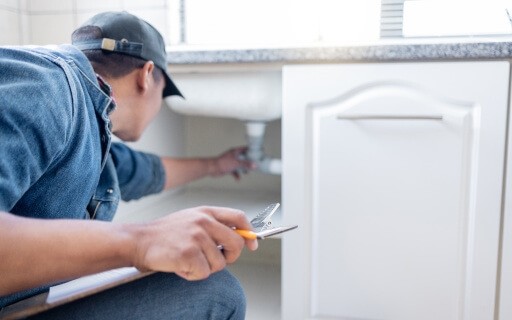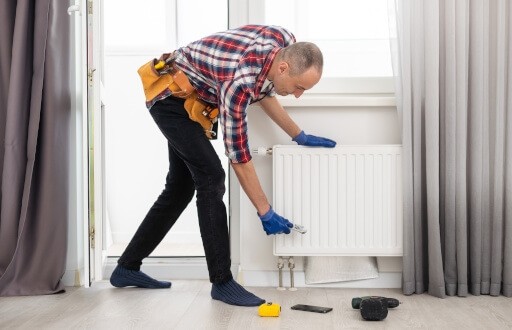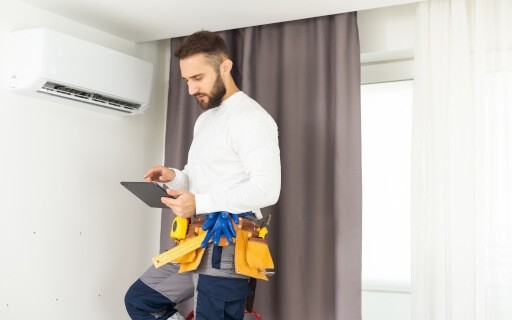Any appliances you supply in your rental property are your responsibility, meaning that it’s your job to keep up with appliance repair and maintenance. Appliances should typically last eight to ten years or even longer, depending on how they’re treated. To keep your appliances in good shape for years to come, it’s a good idea to provide guidelines on how to properly use and care for appliances in the lease.
Even with proper care, appliances will need some TLC and a repair here and there. Appliance technicians charge anywhere from $50 to $500 for appliance repair, taking into account labor, service charges, and parts. If you’re interested in reducing your overhead, you can do so by performing basic appliance repairs and maintenance yourself. Don’t fret — appliance repair is often easier than you think, especially with these tips and tools.
Tools for Appliance Repairs
When completing appliance repairs and maintenance, you may need to take measurements, disassemble metal parts, and make the odd electrical repair. Here’s what should be in your appliance repair toolbox:
- Multi-driver with a complete assortment of bits
- Battery drill
- Tape measure
- Small pry bar
- Pipe wrench
- 16-ounce smooth face hammer
- Multimeter
- Pliers
- Wire splicing tool
Along with these, you’ll want to make use of one more handy tool: the internet. Short of having the actual shop manual in front of you, the internet is your best resource for instructions, tips, specifications, and how-to videos. It’s also a great source for replacement parts, which you can typically receive a few days after ordering, depending on the supplier.
How to Approach an Appliance Repair
Whether it’s a dryer that won’t tumble, a refrigerator that doesn’t stay cool, or an air conditioner that drips, the first thing to do is to find the model number. It’s usually in a prominent place, but sometimes you have to move the appliance or look inside to find it. Once you have that, follow these four steps:
- Start searching online. Open a browser and type in the make and model of your appliance along with the problem you’re having. Chances are someone has uploaded a how-to video or article that addresses your problem in detail. You may even be able to find the service manual online with the right search terms.
- Clear the area around the appliance. You’ll want plenty of room to work. Afterwards, disconnect the appliance and move it as far from the wall as possible. If you’re dealing with a washing machine or any appliance connected to plumbing, have rags and buckets on hand to catch spilled water. For some repairs, you may need to leave the appliance plugged in. If that’s the case, have an extension cord handy, but keep the appliance unplugged until the repair calls for it to be plugged in.
- Take pictures beforehand. It’s a good idea to take pictures before you disassemble anything to help you remember how everything goes back together. It may also be helpful to take pictures as you go in case something goes awry and you need to figure out where you went wrong.
- Put small pieces in a safe place. Small parts and tools like screws should be put in a safe place. Put them in a small, clean container to keep them from getting lost.
Know Your Limits with Appliance Repairs
As the landlord, you may not be able to make every repair yourself, and sometimes it may not even be worth trying to DIY. For example, if you isolate the problem on a refrigerator to a bad compressor, you can remove the compressor to service it, but in that case, it’s usually cheaper to just replace the refrigerator.
There are also some repairs, such as fixing a refrigerant leak in a freezer or air conditioner, that must be done by a licensed service technician. You will also need a licensed tech to service a gas valve on a water or space heater.
However, most basic repairs you can handle yourself, which will potentially save you hundreds of dollars in labor fees. Here are some of the repairs you will likely be able handle:
For the gas water heater
Service the thermocouple. Clean and adjust the pilot tube and burners on a gas water heater or space heater.
For the electric water heater
Change the elements and thermostats on an electric water heater.
For the refrigerator
Repair and replace the door seals, clean or deice the coils, repair the water supply hoses, and replace the control board on your refrigerator.
For the dryer
Service the belts and electric heating element on your dryer and clean the vents.
For the washing machine
Replace the belts, the drain pump, and the control panel on your washing machine.
The Importance of Preventive Appliance Maintenance
Performing routine maintenance tasks will allow you to catch minor issues before they grow into major ones. To avoid major repairs to your appliances, you should perform these preventive maintenance tasks at least one a year:
- Remove lint from dryer vents. Service the ducts all the way to the vent outlet. Remind tenants to clean the lint trap before and after each use.
- Clean dirt and ice from refrigeration coils on all appliances that have them.
- Replace the filters in your refrigerator, dryer, washer, and air circulation system.
As you would for other repairs in your rental property, keep a maintenance record for all your appliances. It will come in handy if you need to make a quick diagnosis if something major goes wrong. Maintenance records may also be helpful to a hired contractor if you can’t handle the next repair yourself. An easy way to keep up with maintenance records is by using Apartments.com. With our online maintenance platform, tenants can submit maintenance requests online. We notify you when you have a request, and you can easily update your tenants as the repair progresses. You can even attach receipts, upload notes, and track expenses for the repairs. You and your tenants can even share images and videos. Keeping everything in one place makes it easy to keep track of repairs, how often something is requiring repair, and how future repairs might impact your budget.
DIY appliance repair and maintenance is doable and a great way to cut costs. Having a toolbox for these basic repairs will give you everything you need to keep your appliances going strong. Although performing repairs yourself is a great route, keep in mind that licensed service technicians are always just a call away if your toolbox comes up short.











